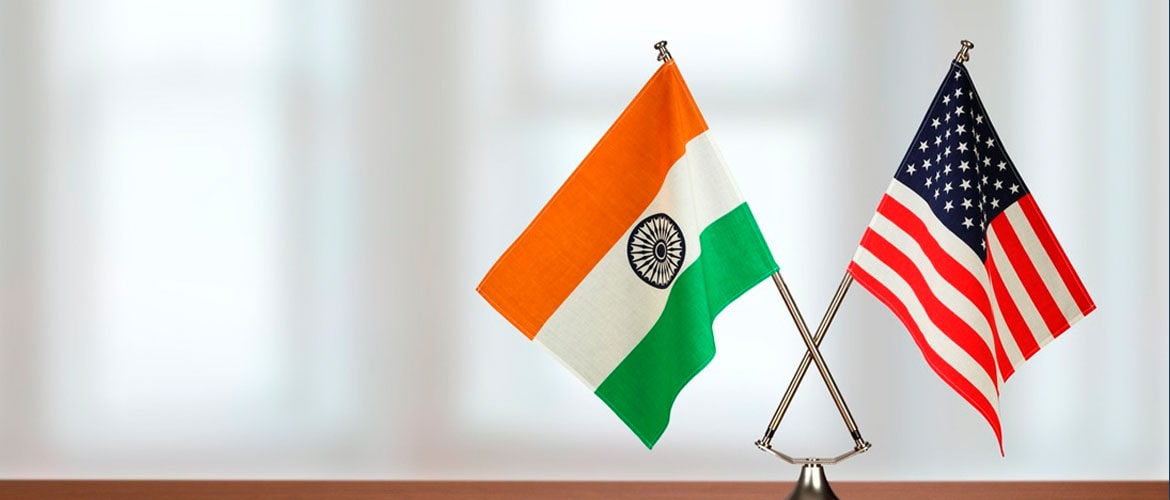We Will Forge Ties With Countries Sharing Our Basic Values
July 25, 2020 | Expert Insights

Richard Fontaine is the CEO of the Centre for a New American Security, a D.C.-based think tank established in 2007. He served as a foreign-policy adviser to Senator John McCain from 2004 to 2009 and worked on the National Security Council staff, and at the State Department during the George W. Bush administration. He also served as Associate Director for Near Eastern Affairs at the National Security Council (NSC) from 2003-04. Mr. Fontaine began his foreign policy career as a staff member of the Senate Foreign Relations Committee, focusing on the Middle East and South Asia. He currently serves as Executive Director of the Trilateral Commission and has been an adjunct professor in the Security Studies Program at Georgetown University’s School of Foreign Service.
The 79th webinar hosted by Synergia Foundation discussed the direction of the Indo–U.S. relationship. This article is based on the views expressed by Mr Richard Fontaine during the webinar as also in various published articles.
It is generally accepted that the continuation of previous administrations’ efforts to build upon the Indo U.S. partnership retained its focus during the presidency of Mr Donald Trump. Both sides see an opportunity in each other, through diplomacy, people-to-people ties, and many other mutual interests.
However, Mr Fontaine pointed out the U.S. foreign policy has seldom remained unchanged and that holds true for Indo – U.S. relations too. While the momentum of these ties has been sustained, but that is not to say they have been linear.
POWER BALANCE WITH CHINA
Indo-U.S. ties can play a major role in balancing power in the Indo-Pacific, an aspect which may have different connotations in practice. Almost two decades ago, Washington DC came to this conclusion and worked towards resolving the differences between the two countries as a legacy of the Cold War, over non-alignment and nuclear weapon testing. There was bipartisan acceptance in the U.S. to forge a closer relationship with a growing India, especially in the field of military technology, and to promote a larger role for India in international institutions including the ultimate recognition, a seat at the high table in the UNSC.
In Mr Fontaine’s assessment, there have been certain recent course corrections which have impacted on the relationship in an adverse manner- curbing immigration for business purposes, removal of trade concessions and demand for a more equitable trade regime. However, the larger objective of maintaining stability in the Indo Pacific vis a vis China has remained steadfast.
Faced with an aggressive China bringing to bear acute military pressure along its Himalayan frontiers, India too is in need of strategic partners to safeguard its national interests. Hence, close ties with the U.S. are highly desirable and possible.
FOCUS ON A FRESH LOOK
Two decades of deepening India-U.S. security cooperation have generated credible results, but both need another look at how they can advance security ties at a time of intensified strategic competition with China.
This is not to say that either the U.S. or India can afford to completely sever ties with China.
China and India are still coupled with trade with a trade deficit of a whopping US$ 48.66 billion (in 2019-20) in favour of China. India may possess the capacity of drug manufacturing to present itself as the pharma company of the world, but the current reality is that it sources 70 percent of its active pharmaceutical ingredients (APIs) from China.
The U.S. too has a trade deficit of US$ 345 billion with China as of 2019. Mr. Trump’s trade war has managed to correct this imbalance to some extent but nowhere near the level when the U.S. can claim that it is no longer dependent upon Chinese supply chains.
“We are looking at something much more nuanced and complicated which is a longer-term alignment of U.S. and India’s aspirations, interests and activities within the context of continued strong economic relations with China, from each of our countries,” he said.
THE FUTURE OF U.S. LEADERSHIP
In the context of the decline of the U.S. as a world leader, Mr. Richard Fontaine said though this has been a common refrain among Americans more than anyone else, the reality is that no other power has emerged as yet that can fill the U.S.’s shoes. In that sense, American power has not fluctuated to that extent to be rendered second to others. Notwithstanding that, it is a challenging time, with a lack of leadership in international relations and incompetence on the domestic front. Yet, it should not inhibit Indo-U.S. relations. If nothing else, it will make the U.S. look harder at countries that share its basic values, like India.
In his article for The Atlantic, Mr. Richard Fontaine states that post-COVID-19, there would be an acceleration of geopolitical changes that are already in progress. At the very most, it would usher in a new global era, one in which American leaders “should be, not bystanders, but its visionaries”. He refers to the Atlantic Charter issued in 1941 that set out American and British goals in World War II. "This forward-thinking effort must begin at home, and ultimately include like-minded partners — the countries that can play a constructive role after 2020.” He goes on to state how during George H. W. Bush's single term in the White House, the United States emerged as the world's preeminent power after four decades while showing incredible expertise and prudence. “Bush and his like-minded officials, National-Security Adviser Brent Scowcroft and Secretary of State James Baker, portrayed this approach as the product of strategic calculation,” he states.
Author: Synergia Foundation Research Team








Comments